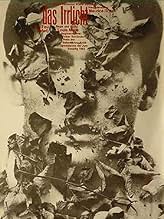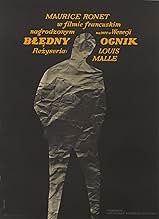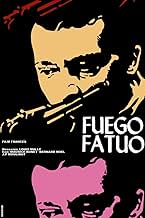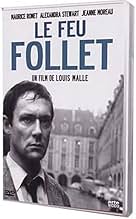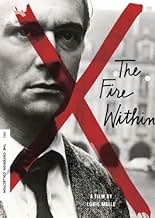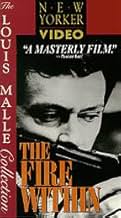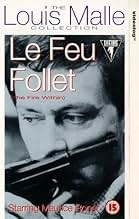Depressed Alain Leroy leaves the clinic where he was detoxified. He meets friends, acquaintances and women, trying to find a reason to continue living. Will this help him?Depressed Alain Leroy leaves the clinic where he was detoxified. He meets friends, acquaintances and women, trying to find a reason to continue living. Will this help him?Depressed Alain Leroy leaves the clinic where he was detoxified. He meets friends, acquaintances and women, trying to find a reason to continue living. Will this help him?
- Director
- Writers
- Stars
- Awards
- 2 wins & 2 nominations total
René Dupuy
- Charlie
- (as René Dupuis)
- Director
- Writers
- All cast & crew
- Production, box office & more at IMDbPro
Featured reviews
A bleak character study of a recovering alcoholic who has lost all hope and decides to kill himself. The film follows him over the course of a couple of days as he wanders about the streets, running into and saying goodbye to former acquaintances. One senses that he's trying out of a last ditch sense of desperation to tease out of these people some hint of how they manage to find things worth living for, but their secrets remain elusive. He carries out his plan, and the film makes the rather unsettling suggestion that some never find anything worth living for.
Not a comforting thought for those who struggle through depressions of their own and look to the positive messages so often found in films to buoy their hopes. But then this movie is not intended to be comforting. It's quiet, lonely, and depressing, but it's also a bit refreshing that director Louis Malle resists a happy resolution and instead stays committed to depicting life the way it actually plays out for some rather than the way the movies would have us believe it does.
Grade: A
Not a comforting thought for those who struggle through depressions of their own and look to the positive messages so often found in films to buoy their hopes. But then this movie is not intended to be comforting. It's quiet, lonely, and depressing, but it's also a bit refreshing that director Louis Malle resists a happy resolution and instead stays committed to depicting life the way it actually plays out for some rather than the way the movies would have us believe it does.
Grade: A
One extraordinary feature of this film is what I would call a "filter". Right from the start, the viewer knows that Alain is hurriedly (yet half-heartedly) searching for something that would give him the will to live, otherwise he will commit suicide. This extremely simple premise leads to extraordinary effects: the everyday happenings, which would seem neutral or even pleasant in any other circumstance, now fill us with disgust. Through the filter of Alain's eyes, we perceive the everyday reality as hopeless and empty of any worthwhile purpose. The author's message: you should apply that filter to your own life. But who has the guts to do it? I know I don't.
10paula-60
This is a mesmerising film about suicide as a rational way out. Ronet is wonderful in the role, sweetly sad, boyishly charming, tragically self-aware. His loving, well-meaning friends he visits on the way to the final "checking-out" are an interesting study and their inability to connect with Ronet or perceive where he's heading is poignant. For me, the best Louis Malle ever. The choice of music is great as well.
Wonderful study of the last day in the life of a man. This movie has one specific scene where Alan Leroy (Maurice Ronet), sitting at a cafe in Paris, takes his first alcoholic drink after months of rehabilitation. This scene is complimented by stunning photography of Chislain Cloquet and the haunting music of Eric Satie. Malle captures the true meaning of existentialist philosophy and manages to create a movie that does not wallow in self-pity but instead celebrates our ability to choose whether to live or die.
THE FIRE WITHIN chronicles the last chapter in the life of a failed writer who is locked in a struggle with existential despair. Alain Leroy is presently in a hospice undergoing treatment for alcoholism, and he is clearly hung-up on the same dilemma that perplexed Shakespeare's Hamlet-should he continue with his lackluster existence, or end the hopelessness of it all? Always the ladies man, he now feels that he was never able to touch or connect with any of the passions of his nature, and alcohol allowed him a safe haven while he awaited his real life to commence. But, it never did. He spends his last few days visiting with old friends trying to uncover an answer to his problem, but finds no solace in their warmth and encouragement. The film follows the premise to the logical conclusion, but whether we were watching the buildup to a suicide was really not the prime concern of the movie. Malle's film succeeds in that he is able to present a three dimensional character at a significant crossroads in his life. Also, the film contains many wonderful scenes of Paris street life from the early 1960's which further increases the richness of this movie.
Did you know
- TriviaFor the first two days, filming was done in color. However, director Louis Malle realized that this was a distraction from the story, so he decided to film in black-and-white. An assistant also later declared that the shooting atmosphere on the set was rather gloomy.
- GoofsAs Alain walks on the streets of Paris, the crew (pushing the dolly) is visible on the shop windows he passes by.
- Quotes
Alain Leroy: I'm killing myself because you didn't love me, because I didn't love you. Because our ties were loose, I'm killing myself to tighten them. I leave you with an indelible stain.
- SoundtracksTrois Gymnopédies
Written by Erik Satie
- How long is The Fire Within?Powered by Alexa
Details
- Release date
- Country of origin
- Official site
- Language
- Also known as
- A Time to Live and a Time to Die
- Filming locations
- Production company
- See more company credits at IMDbPro
- Runtime
- 1h 48m(108 min)
- Color
- Sound mix
- Aspect ratio
- 1.66 : 1
Contribute to this page
Suggest an edit or add missing content

![Watch Bande-annonce [OV]](https://m.media-amazon.com/images/M/MV5BODdiNzczOTktMmMxMC00ZGQ0LTg4YWItZWEzN2FkZTViODk1XkEyXkFqcGdeQXRyYW5zY29kZS13b3JrZmxvdw@@._V1_QL75_UY281_CR0)
